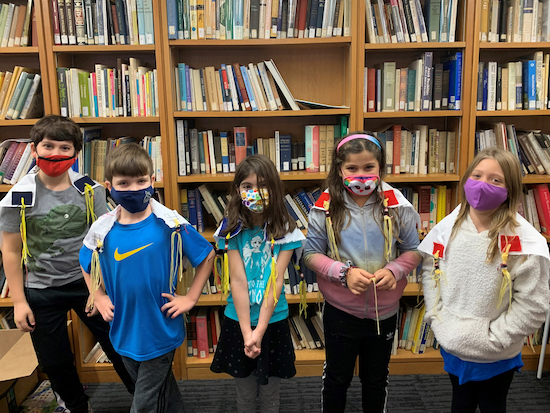When Stephen Wise Free Synagogue had to close its physical doors in March of 2020 due to COVID-19, like so many other schools its Religious School went online. But unlike most others, in fall 2020, Stephen Wise’s school gave students the choice to return to a hybrid model of in-person learning and remote Hebrew lessons or continue fully remotely.
“I was impressed with the creativity of our teachers who found ways to engage kids in their homes,” says Rabbi Rena Rifkin, Stephen Wise’s director of youth education. “But even with all that innovation, I still knew we needed to offer more: we needed to attempt to have in-person religious school classes.”
With the support of the clergy and a dedicated group of parents on the Religious School Committee, she came up with a plan. And by October 2020, Stephen Wise welcomed nearly 100 students into the building with some extensive safety measures in place: all students had to wear masks and certify using a health questionnaire before each time they entered the building — and the school used made sure all students and teachers maintained a safe distance from each other. No cases of COVID-19 transmission have been attributed to the synagogue.
The in-person students developed deeper bonds to each other and to the synagogue. Older students became a sort of support group for one another as they struggled through the pandemic and younger students, formed tight bonds and made new friends. “Finally, there was life again inside the walls of our synagogue,” says Rabbi Rifkin. “Nothing beats sitting in a room together. Learning builds community. Physical togetherness builds community. Proximity to people, even if it’s six feet farther than we want, makes everything feel different.”
Meanwhile, many other students and their families had either left New York to wait out the pandemic or just didn’t feel comfortable coming for in-person classes. For them, the Religious School continued to offer the virtual learning options they’d developed in lockdown. “It was amazing to be invited into new parts of our students’ lives. It was fun to have dogs join Zoom classes and for kids to be able to attend no matter what state or time zone they were in,” says Rabbi Rifkin. “Even if everything were to return to ‘normal’ tomorrow, we wouldn’t stop offering virtual options — it’s exciting, flexible, convenient and a great alternative.”
The final piece of the puzzle was Hebrew. All students have been meeting in small groups (as little as two) for 25-minute virtual sessions with a Hebrew specialist. Each student receives individual attention and is assigned to a group based on their proficiency level. The new model has actually translated to better outcomes than ever before: “Our students had more success and skill growth than any year prior, and developed lovely relationships with our Hebrew teachers,” says Rabbi Rifkin. “This hybrid model of in-person and remote Hebrew has been so successful that we’re going to continue it for the coming academic year.”
“I know there were and remain risks involved with in-person learning that we could never minimize 100 percent,” says Rabbi Rifkin. “But to feel a sense of community, to bond with one another and to see the synagogue as the safe, spiritual center it can be — it’s absolutely worth it.”
Stephen Wise Free Synagogue’s Religious School is now accepting applications for the 2021–22 academic year. To learn more about in-person and virtual options for your child, consider attending an open house or info session, or contact the Religious School office at religiousschool@swfs.org or (212) 877-4050, ext. 230.









